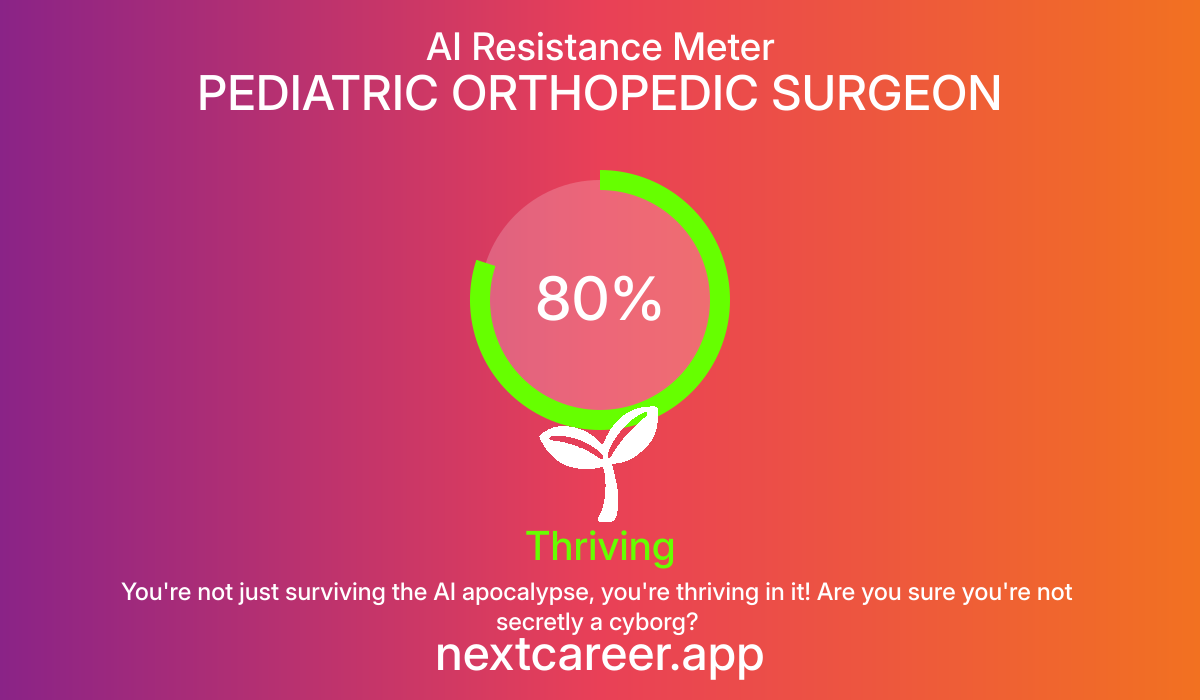AI Resistance Analysis
PEDIATRIC ORTHOPEDIC SURGEON
PEDIATRIC ORTHOPEDIC SURGEON
AI Resistance Score
AI Resistance Meter
Thriving
PEDIATRIC ORTHOPEDIC SURGEON
You're not just surviving the AI apocalypse, you're thriving in it! Are you sure you're not secretly a cyborg?
Pediatric orthopedic surgeons specialize in diagnosing and treating musculoskeletal issues in children. Their high level of training, combined with the requirement for emotional intelligence and complex problem-solving skills, contributes significantly to their resistance against AI. While AI can assist in diagnostics and surgical planning, the intricate skills and human interaction required in surgeries and patient care make full replacement unlikely in both the near and distant future.
Pediatric orthopedic surgeons specialize in diagnosing and treating musculoskeletal issues in children. Their high level of training, combined with the requirement for emotional intelligence and complex problem-solving skills, contributes significantly to their resistance against AI. While AI can assist in diagnostics and surgical planning, the intricate skills and human interaction required in surgeries and patient care make full replacement unlikely in both the near and distant future.
Key Factors
- Cognitive Tasks: AI can assist with data analysis, diagnostics, and treatment plans but cannot fully replicate the cognitive load and experience of an orthopedic surgeon.
- Emotional Intelligence: Surgeons must build rapport with patients and their families, which requires a high level of emotional intelligence and empathy that AI currently lacks.
- Physical Skills: Surgical procedures require fine motor skills and dexterity that AI and robots are beginning to handle with robotic surgery, but human touch and decision-making remain crucial.
- Creative Thinking: While AI can support decision-making with data, the ability to propose innovative solutions or adapt surgical techniques in real-time is a human strength.
Human Advantages
- Ability to engage with patients and families emotionally.
- Complex decision-making in unpredictable surgical environments.
- High-level adaptability to unique patient needs and unforeseen circumstances.
AI Vulnerabilities
- Generative AI advancements could assist in predictive analytics for surgical outcomes.
- Robotic systems may automate routine procedures but will still require human oversight.
Recommended Actions
- Pursue ongoing education and training in AI technologies relevant to orthopedic surgery.
- Emphasize the development of soft skills like empathy and communication in training programs.
- Engage in research regarding the integration of AI into surgical practices to remain at the forefront of technology.
- Focus on unique skills such as complex problem-solving and critical thinking in clinical scenarios.
In the near-term (5 years), AI will enhance data analysis and surgical assistance, but human surgeons will continue to be essential for hands-on care and empathy in interactions with patients. In the long-term (20+ years), while advancements in robotic surgery and AI diagnostics will evolve, the intricate hand-eye coordination and emotional engagement required will maintain the need for human surgeons. The profession may shift towards more collaborative roles with AI as a tool rather than a replacement.

Why Calculate AI Resistance?
Understanding how AI-resistant your career is becoming increasingly important in today's rapidly evolving job market. Our analysis combines multiple factors including required human skills, technological adaptability, and future industry projections to give you a comprehensive view of your career's sustainability.